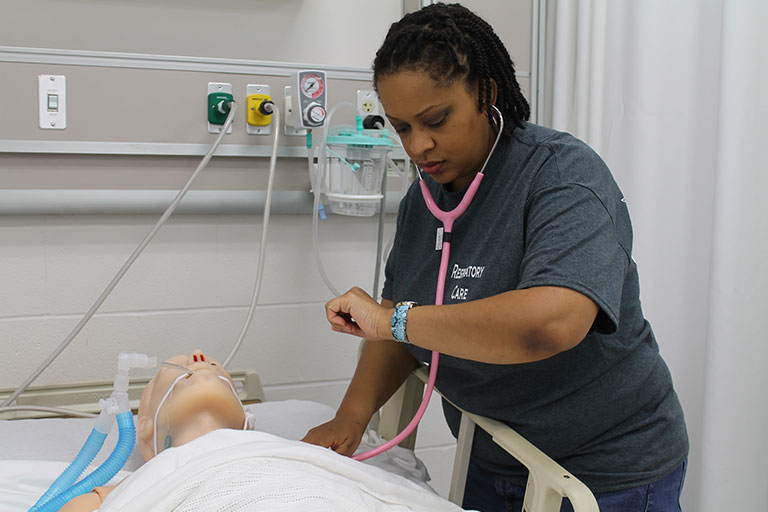What Do Respiratory Therapists Do?
Respiratory Care is a profession involved in supporting cardiopulmonary health, rehabilitation, therapeutics, and life support. Therapists are also extensively involved in cardiopulmonary diagnostic testing, patient evaluation, and care planning. They work with patients of all ages from premature infants to the elderly. Therapists use knowledge of patient physiology and advanced technology in the planning and delivery of respiratory care.
To learn more about the respiratory care profession and to see the kinds of jobs and work that RTs are doing, check out the links below. Respiratory therapists are critical members of the healthcare team and work every day to save lives.

Getting Started
What are my degree, diploma, and certificate options?
ECTC has numerous partnerships with 4-year universities. If you are interested in
a transfer pathway in this field, check out our partnering university pathways. Find more information on transferring from ECTC.
How Do I Pay For This?
Where do I start?
First, you will need to be enrolled at the college. Apply for admission to ECTC to receive information from the Admissions Office about submitting your placement test scores (ACT or other exams) and to schedule a meeting with an advisor to register for your classes.
Program Admission Requirements
You must attend a pre-admission conference to be considered for admission to the Respiratory Care Program. At this one hour long meeting, students will be given information regarding the profession, how students are chosen for the available seats, day to day program operation, and requirements for graduation.
This program also has additional requirements for admission. Contact us for more information.
What Else Do I Need to Know?
Additional Information
- Admission Requirements
- Preadmission Conferences
- Program Costs
- Advanced Policy for Practicing CRTs Information
- Program Goals
- Withdraw and Academic Issues
- Quick Facts
- Graduation Requirements
Respiratory Care Office
RPC 3rd Floor, Room 331
(270) 706-8462
Rebecca A. Higdon, MS, RRT-NPS
Program Director
rebecca.higdon@kctcs.edu
Stephanie Brothers, MAE, RRT
Director of Clinical Education
(270) 706-8660
stephanie.brothers@kctcs.edu
Field Licensure Requirements
Upon completion of the program, graduates in KENTUCKY must pass the National Board of Respiratory Care exam to become certified. Some states require students to become registered. This program prepares students for the registry exam.
Accreditation
The Elizabethtown Community & Technical College Respiratory Care Program, CoARC program number 200548, Associate of Applied Science degree at the Main campus is accredited by the Commission on Accreditation for Respiratory Care (www.coarc.com).
Elizabethtown Community & Technical College was awarded Continuing Accreditation in July 2021 and maintains an Annual Review. The next comprehensive evaluation of the Program, including an on-site review, will occur no later than 2031.
“CoARC accredits respiratory therapy education programs in the United States. To achieve this end, it utilizes an ‘outcomes based’ process. Programmatic outcomes are performance indicators that reflect the extent to which the educational goals of the program are achieved and by which program effectiveness is documented.” The link for programmatic outcomes can be found here: https://coarc.com/students/programmatic-outcomes-data/
- American Association for Respiratory Care
- Kentucky Board of Respiratory Care
- Kentucky Society for Respiratory Care
Note: The Kentucky Board for Respiratory Care may deny mandatory certification for
convicted felons. Questions should be directed to the Kentucky Board for Respiratory
Care.
Length of Program
You can earn an Associate of Applied Science degree in 18 months if you maintain full-time status. Upon successful completion, the graduate is eligible to take the National Board for Respiratory Care Examinations.
This information should not be considered a substitute for the KCTCS Catalog. You should always choose classes in cooperation with your faculty advisor to ensure that you meet all degree requirements.

